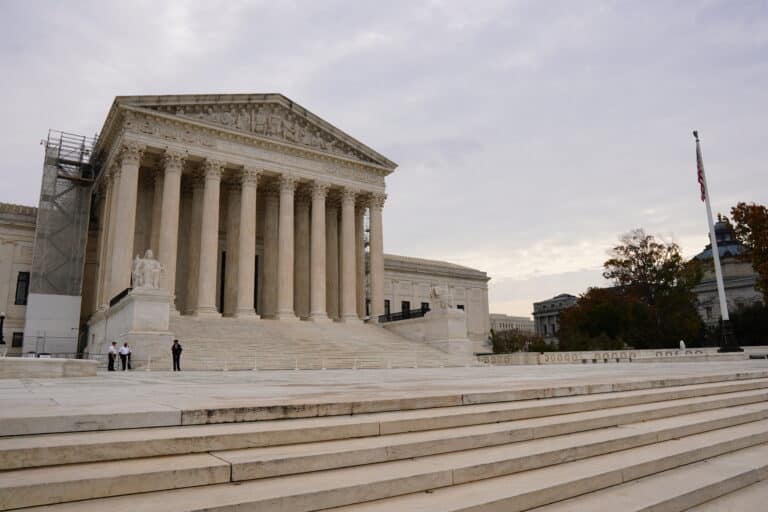On a day when gun-rights advocates hoped that the Supreme Court would announce its next big Second Amendment case, it only informed them which ones it was turning away.
On Monday, the High Court denied petitions for certiorari in Maryland Shall Issue v. Moore and Gray v. Jennings. The cases challenged Maryland’s handgun-purchase licensing requirements and the preliminary injunction standard set in the case against Delaware’s sales ban on “assault weapons” and “large-capacity” ammunition magazines.
None of the justices wrote separately to explain or dissent from the denials.
Monday’s orders list dashes the hopes of gun-rights activists looking to overturn lower court decisions upholding the gun-control laws in question. It continues the Supreme Court’s recent streak of rejecting Second Amendment petitions, even as it agrees to hear government requests for review of decisions striking gun laws down. It could fuel further concern among gun-rights activists about the Court’s resolve to expand on the standard it set in 2022’s New York State Rifle and Pistol Association v. Bruen and address state-level gun bans or several other of its longest-standing constitutional concerns.
However, the Court left open the possibility it would take some of the highest-profile gun cases still pending before it. The Court relisted two other closely watched Second Amendment cases, Snope v. Brown and Ocean State Tactical v. Rhode Island, to be considered again at this Friday’s conference. That keeps gun-rights supporters’ hopes alive for a Supreme Court grant of review of state bans on so-called assault weapons and large-capacity magazines.
With no guidance on how the justices feel about those two cases and the possibility that the Court could relist them multiple times before deciding whether to take them up, those wondering about the future of Second Amendment jurisprudence face an uncertain timeline for further clarity. Still, Monday’s order list indicated what areas of gun law the Court won’t expound upon for the foreseeable future.
Moore concerned a Maryland law requiring residents to obtain a “Handgun Qualification License” before legally purchasing a handgun. Maryland Shall Issue, a local gun-rights group, challenged the law on the grounds that its requirements—which include several hours of approved training, fingerprinting, fees, and a background check that can collectively take up to a month to complete—were too onerous and expensive to pass constitutional muster.
In November 2023, a three-judge panel for the Fourth Circuit Court of Appeals agreed and struck down the law.
“Maryland’s law fails the new Bruen test,” Judge Julius N. Richardson, a Donald Trump appointee, wrote at the time. “As we will explain, Plaintiffs have shown that Maryland’s handgun-licensure law regulates a course of conduct protected by the Second Amendment, and Maryland has not established that the law is consistent with our Nation’s historical tradition.”
The state appealed, however, and the Fourth Circuit reversed the panel’s decision en banc last August. That panel ruled Maryland’s law was presumptively constitutional after the Supreme Court blessed certain kinds of carry permits in the Bruen decision.
“Since the Supreme Court issued Bruen, courts across the country have struggled to answer the many questions resulting from the Court’s new analytical framework,” Judge Barbara Milano Keenan, a Barack Obama appointee, wrote for the majority. “But this uncertainty does not extend to ‘shall-issue’ licensing laws, which the Supreme Court has indicated should not be cast aside in rote fashion by relying on Bruen’s invalidation of ‘may-issue’ licensing laws. We are not free to ignore the Supreme Court’s clear guidance on the presumptive constitutionality of ‘shall-issue’ licensing regimes, nor to unduly constrain legislatures seeking to employ such measures to prevent handgun misuse and violent criminal activity. So, in line with the Court’s ‘shall-issue’ discussion, governments may continue to enforce ‘shall-issue’ firearms licensing regulations that impose nonabusive, objective requirements like background checks and firearm safety training.”
That decision now stands unless and until the Supreme Court addresses permit-to-purchase laws in a future case. Maryland Shall Issue acknowledged the court defeat but promised to continue fighting the permitting scheme.
“With respect to the [Handgun Qualification License] case, that is the end of the road for this particular case, but it is far from the final word on the issue,” the group wrote on Monday.
Meanwhile, the Jennings petition concerned Delaware’s 2022 sales ban on AR-15s and similar rifles, as well as magazines capable of holding more than 17 rounds of ammunition. It arose after the Third Circuit Court of Appeals panel agreed with a district court judge and denied an attempt by gun-rights groups to secure a preliminary injunction blocking those bans last July. The panel wrote that even if a litigant shows they are likely to succeed on legal claims that the government has violated their constitutional rights, a court does not have to issue an injunction blocking the law in question. That decision will now stand and could impact future gun-rights challenges in states covered under the Third Circuit’s jurisdiction.
Aside from the previously mentioned cases, the Court also took a familiar course of action against a fifth pending Second Amendment petition. The justices granted, vacated, and remanded (GVR) the case Dubois v. United States, a challenge to the federal gun ban for convicted felons, back down to the Eleventh Circuit to be reconsidered with the High Court’s US v. Rahimi decision in mind.
That marks a continuation of the Court’s practice of GVR’ing felony gun ban cases for violent and non-violent felons alike, even as questions of the law’s legality continue to split lower appellate courts and previously GVR’d decisions return unchanged.






